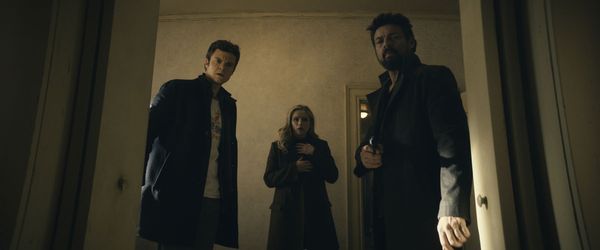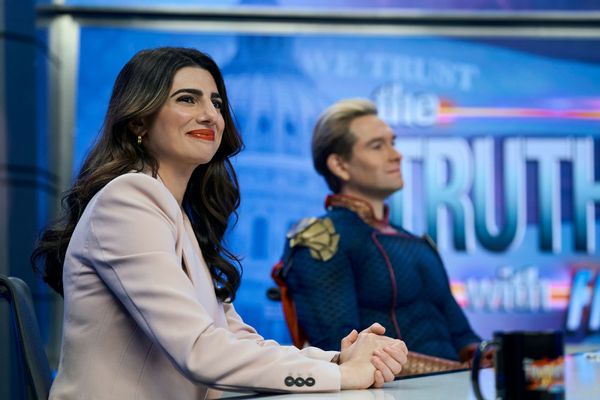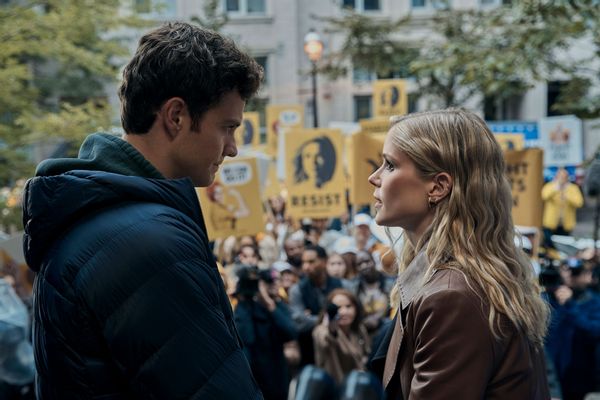
In 2018, I had a short conversation with a well-known TV journalist that I’ll never forget about “The Handmaid’s Tale.” This person had asked me about a commentary I wrote about its harrowing second season and weighed in with a contrary view that went along the lines of, “Actually, it makes me feel optimistic.” Baffled by that interpretation, I asked why.
“Because that will never happen here,” they said.
There is no way this person could have known Roe v. Wade would be overturned four years later. Scratch that — maybe they could have, if they noticed the steady erosion of reproductive freedoms already in motion.
I share this anecdote to illustrate the pitfalls of cloaking real-world crises in elaborate settings, costumes and dystopian oddity. Don't take that the wrong way; these descriptors apply to some of my favorite stories.
But the proliferation of such unrealities allows many to accept “The Handmaid’s Tale” at face value, drawing relief from its alternate reality designation. Who would ever think that the right to work, read or exist apart from men would be stripped from women? Or that a woman's reproductive rights would be controlled by the state? Or that we'd ever find ourselves where we are now?

Genre fiction traffics in extremes that make certain scenarios seem impossible. But nearly all such work is influenced by events that have already happened or are happening someplace on Earth. Just not here. Never here. And that is how people who should know better, like my colleague, can confidently dismiss concerns that these doom-filled stories might actualize as baseless.
My memory of that conversation turned over in my head as I rewatched the fourth season finale of “The Boys.” The Prime Video series made headlines on Thursday when the episode went live with a new “Viewer Discretion Advised” title card that also reads, “This episode contains scenes of fictional political violence. Any similarities to recent events are completely coincidental and fictional. Prime Video, MGM Studios, Sony Pictures Television and the producers of The Boys oppose, in the strongest terms, real-world violence of any kind.”
The finale, which was filmed in 2023, was originally titled “Assassination Run.” In light of the July 13 assassination attempt on Trump at a Pennsylvania rally, it is now simply called “Season Four Finale.”
I’ve already written about the fourth season’s uncanny prescience and brazen anti-Trumpism for which the series’ creator Eric Kripke does not apologize. “I clearly have a perspective, and I’m not shy about putting that perspective in the show,” he told The Hollywood Reporter in June. “Anyone who wants to call the show ‘woke’ or whatever, that’s OK. Go watch something else. But I’m certainly not going to pull any punches or apologize for what we’re doing.”
Kripke declined to talk about the finale with Salon, and a request to Prime Video for an interview with the episode’s writers Jessica Chou and David Reed went unanswered.
The finale’s title is not worth discussing in depth beyond the unsettling coincidence in its timing. Other movies and TV shows have had to postpone their debuts or rename episodes in light of violent tragedies, most of them related to school shootings.
“The Boys,” however, is an outsized apologue of the worst-case ending that is the product of outsized political rhetoric, years and years of it, that demonizes anyone that doesn’t agree with you.
Kripke, Chou and Reed are simply expanding what they already knew about our partisan atmosphere in 2023 to its darkest end. What I wanted to ask them is whether they consulted Project 2025 as they were writing these scripts. It's not as if they needed to, since most of what these superhuman overlords say and do are slight variations of what Donald Trump promises at his rallies, along with Fox News pundits' talking points.

Homelander and his Congressional allies also have a vast propaganda machine devoted to portraying them as heroes, or at worst wrathful (but just!) gods and their critics into demons. Topping that list is Starlight (Erin Moriarty), a former member of Homelander's team who defects to become the face of progressive dissent. Firecracker paints her as a "baby-killer" and a pedophile to her Vought News viewers, inviting them to hunt her supporters, called Starlighters.
The nation’s wealthy conspire with them to build and operate internment camps into which any dissenters opposing their oligarchy can disappear.
“Season Four Finale” shows the culmination of those plans, dropping in on the show’s version of Jan. 6. The House speaker moves to certify the election results making President-elect Robert Singer (Jim Beaver) the new Commander-in-Chief with Victoria Neuman (Claudia Doumit) as his Vice President. Elsewhere the show’s non-powered vigilante heroes are moving quickly to take out Neuman since they and Singer know she’s actually a Supe.
They’re also aware she’s working with the show’s Trump stand-in Homelander (Antony Starr) to invoke the 25th Amendment, placing her in power and giving Homelander a green light to hunt his "enemies," starting with Singer.
But the top hero isn’t content to let events occur as planned and outs Neuman as “super-abled” on national television, sparking riots across the country. While this is happening, a shapeshifter assassin pretending to be Starlight tries to kill Singer in his bunker.
The chameleon nearly succeeds before the actual Starlight emerges from her imprisonment and dispatches her impersonator. But it’s all for nothing since they record Singer talking about his plan to take out Neuman.
That clip leaks to the press right after The Boys’ ousted leader Billy Butcher (Karl Urban) murders Neuman, setting in motion Homelander’s master plan. Singer is arrested, the Speaker of the House is named president and by executive order declares martial law, naming Homelander the country’s top cop.
His first act is to hunt anyone who threatens his reputation, or that he just doesn’t like. He and the three remaining members of his squad The Seven begin his purge by murdering half of his company's employees.
Before she’s killed Neuman warns him that for his plan to work, he must take out half the country, a task easily handled once he deputizes everyone with powers. A handful make quick work of The Boys, who are swiftly renditioned despite their best efforts to disappear before everything goes sideways on a global scale.
This happens as the backdrop to Vought Network talking head and Christian fascist Firecracker (Valorie Curry) theatrically celebrating this violent regime change with her 2024 version of “It’s Morning in America”:
“We wake up to a new world where hope, purity, and Jesus’ love shine down on us all,” she says, “. . . Where America finally sees the woke mob for what it is: monsters who want to destroy our heritage, traffic our children and feminize our men. Where, with Homelander’s guidance, we will come together in unity.”

There it is again, the recurring buzzword at last week’s Republican National Convention in Milwaukee. Of course, as Salon's senior politics writer Amanda Marcotte observed after interviewing convention attendees, Trump's followers interpret "unity" in all kinds of ways while denouncing Democrats for reminding the public of Trump's statement that he would be a dictator "on day one," and citing his followers' readiness to embrace fascism and violence.
Supporters like Heritage Foundation president Kevin Roberts, who declared on Real America's Voice network that "we are in the process of the second American Revolution, which will remain bloodless if the left allows it to be."
It may have been easier in the past to simply view “The Boys” as nihilistic escapism or somehow comfort ourselves by pointing to its impossible components as evidence that our society would never fall that far. This is despite many people citing our culture’s love affair with superheroes as a symptom of our willingness to associate wealth and celebrity with suitability for leadership.
The “if/then” game of speculative writing is devoted to reshaping the possible into situations the reader or viewer can assure themselves aren’t real and never could be. But these latest chapters of “The Boys” contain too many correlations to current events to not view it as a warning.
Even so, this fourth season of “The Boys,” its penultimate, promotes the belief that most people harbor good intentions while understanding that is not enough to save us.
This is the conclusion its everyman hero Hughie (Jack Quaid) lands on when their chances of survival have diminished to nothing. “If we’re ever going to win against monsters,” he says, “I think we need to start acting human.”
That only works if those aligned against you don't get off on inhumanity. Our last view of Hughie shows him being stuffed into a windowless truck by people in black uniforms. He signals to his fiancée Starlight to fly away, not fight. With that, she flings herself into the endless unknown, throwing her lot in the rest of us.
All episodes of "The Boys" are streaming on Prime Video.







